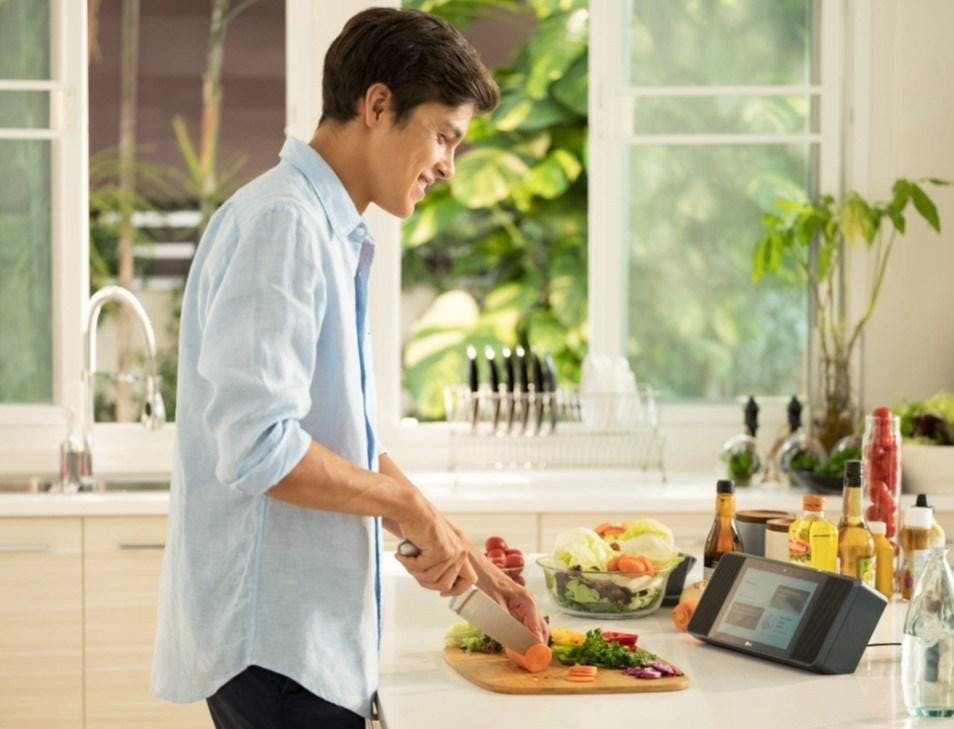Whether it’s a mobile phone, television or laptop, manufacturers always seem to be rolling out new models that catch the attention of curious consumers. Technology is racing faster than ever to create intelligent devices.
While many personal items are making major advances, standard kitchen appliances have taken longer to get on board the tech train – but not for long. Slow but sure, companies are now offering a wider selection of connected appliances that improve energy efficiency and integrate with personal devices.
The Consumer Technology Association predicts nearly 30 million smart-home products will be sold in 2019 (particularly for home security), an increase of 23% from last year. Among homeowners recently upgrading kitchen appliances during renovations, 31% added a home assistant, according to a recent study.
The assistant market – including Google Home, Amazon Alexa and Apple HomePod – opens the virtual door to a full range of possibilities in the abode. The kitchen may be the heart of the home but it has been slower to adapt to the tech trend because major appliances last so long (up to 20 years).
Major manufacturers such as GE, LG, Samsung, Bosch and Miele – brands commonly seen in King County homes – are introducing intelligent appliances that can make life easier while in the kitchen or when at the market. Bosch, for example, has integrated its ovens, cooktop ranges and hoods, along with refrigerators and dishwashers, with its Home Connect app. Homeowners can check if their cooktop is on, preheat ovens and get notifications when a meal is ready through the app, which integrates with Alexa and Google Home to allow appliances to react to voice commands.
GE offers a 27-inch, touch-screen Kitchen Hub with its range/hood combo to create shopping lists, access recipes and search the internet. It also has live video-chat functionality and a camera for checking dishes as they cook. You can even stream Netflix while slicing and dicing. Kitchen Hub also works in other areas of the home to monitor the thermostat and check on the lights and door locks.
LG uses its SmartThinQ app to control a whole range of devices – kitchen appliances, washer/dryer and even vacuum cleaners. The devices can also be controlled through voice assistants. Samsung offers Family Hub, a digital bulletin board on the fridge in which people can add virtual sticky notes or enable the camera to look remotely from your phone to see if you need milk while grocery shopping.
There are also smart faucets – some made by Kohler and Delta – that, with a wave of an arm, allow you get running water from the kitchen sink without touching a handle while combining wet ingredients to make that meatloaf for dinner. Another faucet uses a hand dial to accurately measure water – from a half-cup to five cups.
In recent years, kitchens have included specialized makers for bread, yogurt, pasta and all-in-one slow-cook meals. Who has room for all of these items on the countertop? Now, in addition to using smart technology, appliance manufacturers are using their “smarts” by combining popular stand-alone pieces in their existing line of heavy-duty appliances.
Some oven/range manufacturers are wising up by integrating some of the same features sold separately. Signature Kitchen Suite – which makes high-end appliances – now offers a built-in sous vide (slow warm-water bath) cooker, steam/convection oven and griddle. Some of GE’s top lines now offer air-frying capability, a popular technique for cooking fried foods without using large amounts of cooking oil and without the smell. (About 4 million stand-alone air fryers were purchase in a recent 12-month period, according to NPD Group.)
If you’re all thumbs in the kitchen, LG has partnered with Tovala’s meal-delivery system to simplify cooking in the home. Using the Tovala app to scan the meal’s bar code, LG’s smart ovens will plan and cook the food while you sit, relax and sip your favorite adult beverage.
Speaking of alcohol, there’s now even a smart home-brew beer appliance on the market. LG just introduced HomeBrew, a beer-making machine that won the 2019 Innovation Award at the Consumer Electronics Show in Las Vegas. LG says HomeBrew can make American IPA, pale ale, English stout, pilsners and more, and – like most new devices and appliances – it can be controlled remotely using an app or voice commands through a home assistant.
What will appliance and device makers think of next? It’s all brewing in and around the kitchen.




